Reviews
You won't find reviews of Hike Your Own Hike or The Hidden Europe here (that's a lie: there's one review for The Hidden Europe). Instead, this section is for my review of other books, especially nonfiction books, which I comprise 95% of my reading. I occasionally review clothes, movies, a politician, a gadget, or anything else that looks promising.
I've put my best reviews here, but if it's not enough, then you'll find hundreds of reviews on Amazon. I am one of the top 10,000 reviewers on Amazon with over 1,500 helpful votes. And yes, I can review your product if you'd like. Just contact me to see if I'm interested.
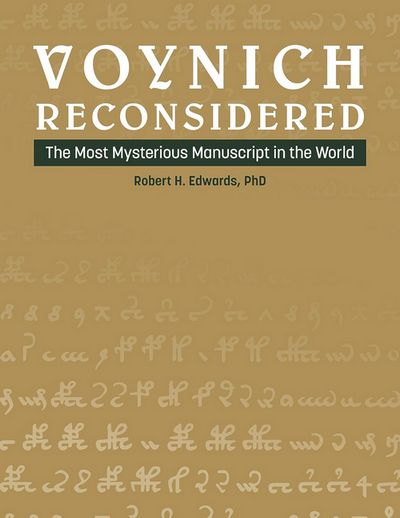
Egyptian hieroglyphics confounded Egyptologists for centuries until the discovery of the Rosetta Stone.
The Voynich Manuscript is another old text that has perplexed experts since its discovery about 500 years ago.
Dr. Robert H. Edwards specializes in investigating the biggest mysteries of the 20th century. I interviewed him on the 100th anniversary of George Mallory's death. I interviewed him again after we found Mallory's climbing partner's foot. Spoiler: We still don't know whether they reached Everest's summit.
The other mystery Edwards investigated was D. B. Cooper, who stole $200,000 and disappeared after skydiving.
Now, Edwards turns his analytical brain to the world's most mysterious manuscript: the Voynich Manuscript.
Voynich Reconsidered: The Most Mysterious Manuscript in the World is Dr. Edwards's attempt at decoding this headache-producing document. If you think James Joyce's Finnegans Wake is hard to decipher, try the Voynich Manuscript!

When Everyone Knows That Everyone Knows is Steven Pinker's worst book, but it's still fascinating, especially if you're into logic and puzzles.
Disclosure: I've read all of Pinker's books, and I gave them all five stars. I graduated from Harvard, where Pinker teaches. I received a free advanced copy of Everyone Knows That Everyone Knows from the publisher. None of these factors biases my judgment: I give this book 3.5 stars.
When Everyone Knows That Everyone Knows is available on September 23, 2025. Pre-order it now if you find this review captivating.
The book's publisher, Simon & Schuster, doesn't want reviewers who received an Advanced Review Copy to quote from the book, because it's always possible that the final version will differ. Nevertheless, I'll quote from passages that illustrate the book's main points. Even if the publisher deletes these passages in the final release, they're still indicative of what the book is about.
When Everyone Knows That Everyone Knows is about common knowledge.
What is common knowledge?
Other terms for common knowledge include open knowledge, conspicuous knowledge, public knowledge, interactive knowledge, shared reality, shared awareness, collective consciousness, and common ground.
Why is common knowledge important?
Many of our harmonies and discords, I hope to show, fall out of our struggles to achieve, sustain, or prevent common knowledge.
Later, Pinker asserts:
Many of our tensions, personal and political, arise from the desire to propagate or suppress common knowledge.
What answers does Pinker's book answer?
Pinker's book answers questions like:
- Why do people hoard toilet paper at the first sign of an emergency?
- Why are Super Bowl ads filled with ads for crypto?
- Why, in American presidential primary voting, do citizens typically select the candidate they believe is preferred by others rather than their favorite?
- Why did Russian authorities arrest a protester who carried a blank sign?
- Why is it so hard for nervous lovers to say goodbye at the end of a phone call?
- Why does everyone agree that if we were completely honest all the time, life would be unbearable?
Where Pinker disagrees with Yuval Harari
Yuval Harari and Stephen Pinker are among my top 3 authors (I also love Bill Bryson). Therefore, my ears paid attention when Pinker disagreed with a minor point Harari made about humans creating fictions. I quoted one of those fictions when I explained Why is Bitcoin Worth Anything?
Pinker says Harari is too extreme when he categorizes many human inventions as "fictions." Pinker partially agrees, but points out a nuance:
Our world is built on conventions that allow us to coordinate effectively and are self-reinforcing because they are common knowledge. Conventions like the English language, Christianity, the United States of America, the euro, and Microsoft are not exactly “fictions.” They are very real, even if they are not made out of physical stuff. Common knowledge creates nonphysical realities.
This passage sums up the book
I had long wondered why people often don’t say what they mean in so many words but veil their intentions in innuendo and doublespeak, counting on their listeners to read between the lines. The answer, I suggested, was that barefaced statements generate common knowledge but genteel euphemisms do not, and common knowledge is what ratifies or annuls social relationships.
In this book I’ll expand on that theory and show how common knowledge also explains fundamental features of societal organization, such as political power and financial markets; some of the design specs of human nature, such as laughter and tears; and countless curiosities of private and public life, such as bubbles and crashes, road rage, anonymous donations, long goodbyes, revolutions that come out of nowhere, social media shaming mobs, and academic cancel culture.
By the time you finish the book I hope you’ll be equipped to understand phenomena I never got around to explaining, such as gaslighting, Kardashian celebrity (being famous for being famous), mock outrage (“I’m shocked, shocked to find that gambling is going on in here”), “red lines” in international relations, and the psychological difference between “cc” and “bcc” in email etiquette.
Funny story
As usual, Pinker litters his book with humor, including comic strips. One of my favorite parts is when he tells this joke:
A defendant was on trial for murder. There was strong evidence indicating his guilt, but there was no corpse. In his closing statement, the defense attorney resorted to a trick.
“Ladies and gentlemen of the jury,” he said. “I have a surprise for you all—within one minute, the person presumed dead will walk into this courtroom.”
He looked toward the courtroom door. The jurors, stunned, all looked eagerly.
A minute passed.
Nothing happened.
Finally the lawyer said, “Actually, I made up the business about the dead man walking in. But you all looked at the door with anticipation. I therefore put it to you that there is reasonable doubt in this case as to whether anyone was killed, and I must insist that you return a verdict of ‘not guilty.’”
The jury retired to deliberate.
A few minutes later, they returned and pronounced a verdict of “guilty.”
“But how could you do that?” bellowed the lawyer. “You must have had some doubt. I saw all of you stare at the door.”
The jury foreman replied, “Oh, we looked, but your client didn’t.”
Social paradox
I learned about a social paradox, a term suggested by the psychologist David Pinsof for phenomena like these:
1. We try to gain status by not caring about status.
2. We rebel against conformity in the same way as everyone else.
3. We show humility to prove we’re better than other people.
4. We don’t care what people think, and we want them to think this.
5. We make anonymous donations to get credit for not caring about getting credit.
6. We bravely defy social norms so that people will praise us.
7. We avoid being manipulative to get people to do what we want them to do.
8. We compete to be less competitive than our rivals.
9. We help those in need, regardless of self-interest, because being seen as the type of person who helps those in need, regardless of self-interest, is in our self-interest.
10. We make subversive art that only high-status people appreciate.
11. We make fun of ourselves for being uncool to prove we’re cool.
12. We self-righteously defend false beliefs to prove we care more about the truth than virtue-signaling.
13. We help our friends without expecting anything in return, because we know they would do the same for us.
14. We show everyone our true, authentic self—not who society wants us to be—because that is who society wants us to be.
Chapter against wokeism
One of the things I admire most about Pinker is that he's a moderate, unlike most of the leftists at Harvard. Pinker spends a chapter destroying the woke ideology and the cancel culture, which is contrary to the open discourse that universities must have. He writes:
According to the Foundation for Individual Rights and Expression (FIRE), between 2000 and mid-2024 there were more than thirteen hundred attempts to punish scholars for constitutionally protected speech in American colleges and universities. These included 243 incidents of censorship and 273 firings, 62 of them of tenured professors, a regime of intellectual repression more severe than during the McCarthy era.
Worse, for every scholar who is sanctioned, many more self-censor, knowing they could be next. It’s no better for the students, a majority of whom say that the campus climate prevents them from saying things they believe.
Academic freedom, once a narrow concern of academics, was thrust into the national spotlight in late 2023 because of a widely viewed congressional hearing on anti-Semitism on American campuses, in which legislators grilled the presidents of three of America’s eminent universities, including Harvard, my employer.
In response to the hypothetical question of whether students calling for the genocide of Jews violated university policies, Harvard’s president, Claudine Gay, gave the inadvertently Bartlett’s-worthy answer, “It depends on the context.”
The fury, from both the right and the left, was white-hot. Gay was technically correct in saying that students’ political slogans are not punishable by Harvard’s rules unless they cross over into intimidation or incitement of violence, just as they are not punishable by American law under the First Amendment. But her testimony was excoriated because Harvard had just come in at last place in FIRE’s Free Speech ranking of 248 colleges, with a perfect score of zero.
Among other things, the university had effectively driven out a biologist who said there are two sexes, persecuted an epidemiologist who had signed a conservative amicus brief on gay marriage eight years earlier, and disinvited a feminist scholar who questioned the policy of housing violent men who identify as transgender in women’s prisons. So for the president of Harvard to suddenly come out as a born-again free-speech absolutist, disapproving of what genocidaires say but defending to the death their right to say it, struck onlookers as disingenuous.
A cry for free speech
The debacle added another millstone to the sinking reputation of American higher education, a descent more precipitous than for any other institution. A major reason was the impression that universities were enforcing orthodoxies and repressing disagreement, like the inquisitions, purges, and fatwas of more benighted times and places. The impression had already been stoked by viral videos of professors being mobbed, cursed, and heckled into silence.
Conclusion
With so many good passages, why only 3.5 stars? It's because the first 100 pages are filled with tedious logic exercises that disinterested me. In all the other Pinker books, I savor every word. In When Everyone Knows That Everyone Knows, I skipped pages, exhausted by Pinker's nonstop discussion about how John knows what Sally thinks about John knowing about Sally's kid (and far more layered than that!). My eyes rolled.
Still, When Everyone Knows That Everyone Knows is another worthwhile book, even if it's Pinker's worst. Pinker's worst is among the top 1% of all nonfiction books of 2025.
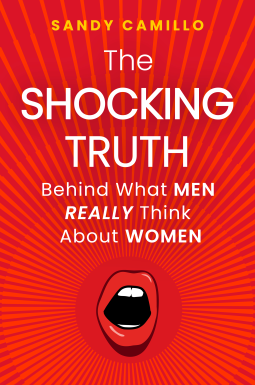
The Shocking Truth Behind What Men Really Think is an enticing book title. However, this book is a prime example of a tome that would have been better suited as an article.
Each chapter follows this format
1) It introduces a topic (e.g., if men believe in female equality).
2) Three fictitious men (Jim, Buddy, and Noah) share their thoughts.
3) Yesterday: The book spends pages discussing what men of yesteryear used to believe regarding the topic. If you're interested in learning about the ancient Romans' views on women, you'll appreciate this section.
4) Today: It covers the last 100 years.
5) Survey: It shares the results of an anonymous survey. This is the only interesting part.
The survey results are divided into three parts
1) What men think
2) What women think men think
3) Sharing revealing survey comments from men and women
KEY POINT: This was an anonymous survey, so men had no incentive to lie.
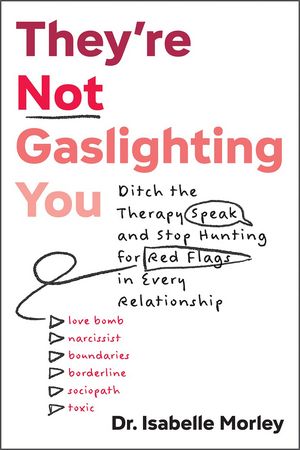
I’ve never highlighted a book as much as They’re Not Gaslighting You: Ditch the Therapy Speak and Stop Hunting for Red Flags in Every Relationship.
It's my favorite book in 2025!
Author Dr. Isabelle Morley gives us a timely book that rejects the reckless proliferation of the following terms:
- Sociopath
- Psychopath
- Love bomb
- Narcissist
- Boundaries
- Borderline
- Toxic
- Gaslighting
Video
Podcast
Timeline
00:00 Morley's credentials
01:45 What's the problem?
02:45 Gaslighting
06:40 Absolving ourselves
08:00 Red flags
10:00 Consistency is key
13:00 Narcissists
15:00 Sociopaths and Psychopaths
17:00 Boundaries
22:30 Needing to be right is wrong
26:20 Three keys to success
28:00 The right partner
31:20 Conclusion
Who is Dr. Isabelle Morley?
Dr. Morley is not a chronic gaslighter trying to convince the world that she doesn't gaslight by writing a book about it. Here's her resume:
- Author of Navigating Intimacy and They’re Not Gaslighting You
- Co-host of the podcast Romcom Rescue
- Contributor to Psychology Today
- Advisory Board Member of the Keepler app
- Founding Board Member of UCAN
- Member of the American Psychological Association
- Certified in Emotionally Focused Therapy (EFT)
- The Gottman Method – Completed Levels 1 and 2
- Relational Life Therapy – Completed Level 1
- PsyD in Clinical Psychology from William James College, 2015
- Doctoral project researching hookup culture’s impact on relationship formation, 2015
- Master's in Professional Psychology from William James College, 2013
- Bachelor of Arts from Tufts University, 2011
My Fatima Story
I dated a woman for two years. Let’s call her Fatima.
In the second half of our relationship, Fatima bombarded me with many of the highly charged and often misused words listed above.
After she dumped me the fifth and final time, I finally pushed back on her barrage of accusations. I said to her, “So, you truly believe I’m a narcissist? Let’s look up the clinical definition of a narcissist and see how I stack up.”
She agreed. Perplexity wrote:
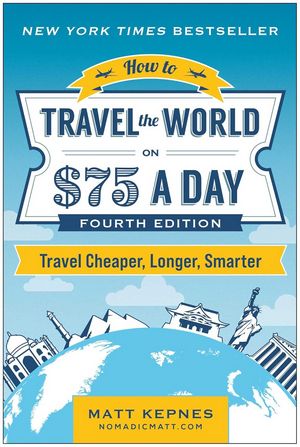
Nomadic Matt is a pioneering travel blogger. One day, we'll call him the grandfather of travel blogging during the Golden Era of travel blogs.
He's not known for his travel feats but rather for the extensive tips he's provided on his popular website, which focuses on budget travel.
The book's budget used to be $50/day, but inflation and a post-COVID world forced Matt to update his book.
In 2025, he refreshed his bestselling book, which is now called How to Travel the World on $75 a Day.
As part of his book tour, he's appearing on the WanderLearn Show twice!
#1 How Nomadic Matt Travels on $75 a Day!
Nomadic Matt discusses:
00:00 Splitting between Austin and NYC
02:40 Couchsurfing
05:15 Stupidly cheap
07:00 EatWith and Traveling Spoon
Video
Podcast
#2 Nomadic Matt's Best Travel Tips
Nomadic Matt discusses
00:00 When to book a hotel
02:40 Why is Africa left out of his book?
05:10 Bilt Rewards Credit Card
08:10 Airline booking tips
09:20 Travel insurance
12:00 Tourist Cards
15:00 Why Matt travels less than before
18:30 Blogging is dead?
Video
Podcast
Questions
- What's the most embarrassing or ridiculous thing you've done to save money while traveling?
- What's the difference between EatWith, WithLocals, and Traveling Spoon?
- When do you usually book your hotels?
- Why is Africa left out?
- Are tourism cards still worth it?
- When do you use travel insurance?
- Why not use Kiwi?
- What are Bilt Rewards?
His book is packed with tips. Here are my favorite ones.
The best websites to keep track of the latest credit card deals
Pay your rent and get frequent flyer points with Bilt Rewards
Matt's top three airline booking sites
My favorite airline website is Kiwi, and use this link to get $10 off. He doesn't mention Kiwi in his book.
Instead, his favorite flight booking sites are:
For insurance
- Safety Wing
- World Nomads
- MedjetAssist
- IMG
- InsureMyTrip for comparison shopping
Sell your old clothes to raise money for your trip
Online Garage sale to raise funds and downsize
- VarageSale
- OfferUp
- Swappa for electronics
- Gazelle
- Decluttr
Anytime Mailbox starts at $6 and has several locations.
Lodging Sites
- LateRooms
- Last Minute
- Hotel Tonight
- Priceline
- Hotwire
- Roomer allows you to buy someone else's hotel reservation at a steep discount
- Agoda excels in East Asia
Food
Matt is a foodie. I am not. Here are some of his favorite sites:
- EatWith has 5000+ hosts in over 130 countries
- WithLocals
- Traveling Spoon
Ride-sharing or hitchhiking for the 21st century
Search for "ride-sharing" and the name of the region/country where you are traveling. You'll usually find options. I've used BlaBlaCar in Europe, for example.
Tourism Cards
Nomadic Matt sold me on the tourism cards that give you access to popular sites and public transportation. Although that can save you nearly half the price, it's only suitable for those doing a whirlwind, fast, and comprehensive tour. If you only want to see the British Museum, don't get the London Pass. However, it makes sense if you plan to see most of the significant sites.
Why is Africa left out?
The first half of the book offers general, practical advice. The second provides specific guidance to various regions. For example, he has a section about Australia.
You'd think a book that helps travelers live on $75 a day would encourage tourists to visit Africa. Like Southeast Asia, parts of Africa have a low cost of living.
For example, in 2013, in Benin, I rented a two-room place with a shower (but a shared outhouse for a toilet) for $10 per month! Ten years later, the price may have doubled to $20 a month.
Still, Nomadic Matt confesses, "I had to make trade-offs and omit the lesser-visited countries and regions..." (Kindle Location 1434).
I won't quibble with his decision or logic.
Conclusion
When I got an advanced copy of Nomadic Matt's book, I expected to be bored out of my mind. I figured it was a book for beginners or intermediate travelers, not hyper-experienced travel studs like me.
As usual, I was wrong.
Nomadic Matt pumped me with many ideas I was oblivious to. Although I shared my favorite ones on this page, buy How to Travel the World on $75 a Day to get all his excellent advice.
VERDICT: 9 out of 10 stars

An African History of Africa by Zeinab Badawi presents a comprehensive exploration of the continent's history from an African perspective, challenging long-standing Western narratives that often overlook Africa's rich past.
Overview
The book begins with the origins of humanity, focusing on significant themes and civilizations throughout Africa's history. Badawi emphasizes the continent's diversity and the importance of local voices, drawing on interviews with historians, anthropologists, and local storytellers across over thirty countries. This approach aims to provide a more nuanced understanding of Africa's historical narrative, moving beyond the typical focus on colonialism and slavery.
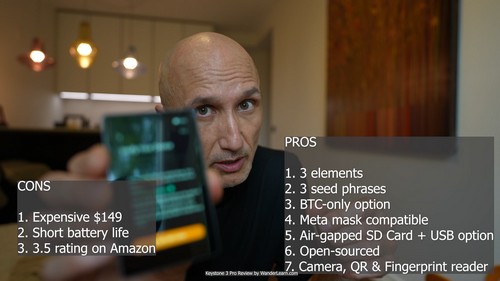
Is the Keystone 3 Pro the best hardware wallet for 2025?
It's certainly in the top 5 finalists!
My review hits on 10 points: 7 positive, 3 negative.
Please see my video review below:

If you appreciate my honest review, please buy the Ellipal.
I want to highlight that:
* Ellipal is a leader in air-gapped cold crypto wallets
* Ellipal has a 4.0-inch display that shows precisely what you’re signing; trust what you see.
Video

Vegans have a marketing problem: they're perceived to be annoying, self-righteous, judgmental, and inflexible.
Author Matthew Halteman's book Hungry Beautiful Animals is designed to fix that perception and make veganism more appealing and less threatening.
Visit Matt Halteman's website about Hungry Beautiful Animals.
He appears on the WanderLearn Show four times! Listen or watch all 4 episodes below:
#1 Does Going Vegan Have To Suck?
Matthew Halteman and I discuss his book Hungry Beautiful Animals. Here's the timeline of our discussion in case you want to skip to a section.
00:00 Intro
04:30 Marketing Problem?
07:00 Practical Tips
10:00 Kindergarten Values
12:00 Abstract food
16:30 Aspirations
20:40 Fish
Video
Podcast
#2 What Do Vegans Think about Lab-Grown Meat?
Lab-grown meat has many other names:
- Cultivated Meat: This term is increasingly favored as it accurately describes growing meat from animal cells in a controlled environment.
- Cell-Based Meat: This name emphasizes that the meat is derived from animal cells rather than whole animals, highlighting its scientific origins.
- Cultured Meat: Like cultivated meat, this term refers to meat produced through cellular agriculture techniques.
- Clean Meat: This term was popular among early advocates, suggesting a more ethical and environmentally friendly alternative to traditional meat.
- Synthetic Meat: This name indicates that the product is artificially created, which can evoke mixed consumer reactions.
- Slaughter-Free Meat: This term appeals to ethical consumers concerned about animal welfare and the implications of traditional meat production.
Matthew Halteman and I discuss his book Hungry Beautiful Animals. Here's the timeline of our discussion in case you want to skip to a section.
Podcast
Video
#3 Tips on Taking Baby Steps To Becoming Vegan
Matthew Halteman and I discuss his book Hungry Beautiful Animals. Here's the timeline of our discussion in case you want to skip to a section.
00:00 Know yourself
05:15 Negotiating and compromising
09:15 Cognitive Dissonance
Video
Podcast
#4 Are Vegans Unhealthy?
Matthew Halteman and I discuss his book Hungry Beautiful Animals.
Professor Halteman mentions NutritionFacts.org.
Video
Podcast
Book review
In his excellent book "The Better Angels of Our Nature," Steven Pinker observed that humanity has become less barbarous with each passing century.
Consider the improvements to:
- Women's rights
- Gay rights
- Racism
- Slavery
- Death penalty
- Wars
- Prisons
Pinker was asked, "What will people in the 22nd century think of us? What are we doing that will seem barbarous and immoral to future humans?"
Pinker said (I'm paraphrasing), "The way almost everyone financially supports the barbarous and inhumane treatment of animals by buying and eating animals."
True.

Yuval Noah Harari is one of my top three favorite authors. I also love Bill Bryson and Walter Isaacson.
Therefore, I was thrilled that a few months ago, I got an advanced copy of Nexus: A Brief History of Information Networks from the Stone Age to AI, which launches today, September 10, 2024.
It's a 515-page book but has 11 chapters filled with headers, making it modular and readable.
I also reviewed his previous book, 21 Lessons for the 21st Century.
I loved Nexus, although Homo Deus is still my favorite Harari book.
Nexus explores the evolution of information networks from prehistoric times to the present, focusing mainly on the impact of artificial intelligence (AI) on society.
Listen to the podcast
- Mallory, Irvine and Everest book by Robert Edwards
- The Gifts of Africa by Jeff Pearce fails deliver
- A Just Transition: Making Energy Poverty History with an Energy Mix by NJ Ayuk
- Coinkite's Coldcard MK4 vs the MK3 - Bitcoin's 2023 Hardware Wallet
- Good White Racist? Racial Injustice Book by Kerry Connelly
- Virtual Society by Herman Narula
- Comparing The Red Planet book with Dinner on Mars
- Books 'When the Heavens Went on Sale' vs. 'Space Barons' vs. 'Rocket Billionaires'
- Military, Navy, War Books
- Royal Navy Versus the Slave Traders by Bernard Edwards
Your comment will be deleted if:
- It doesn't add value. (So don't just say, "Nice post!")
- You use a fake name, like "Cheap Hotels."
- You embed a self-serving link in your comment.


